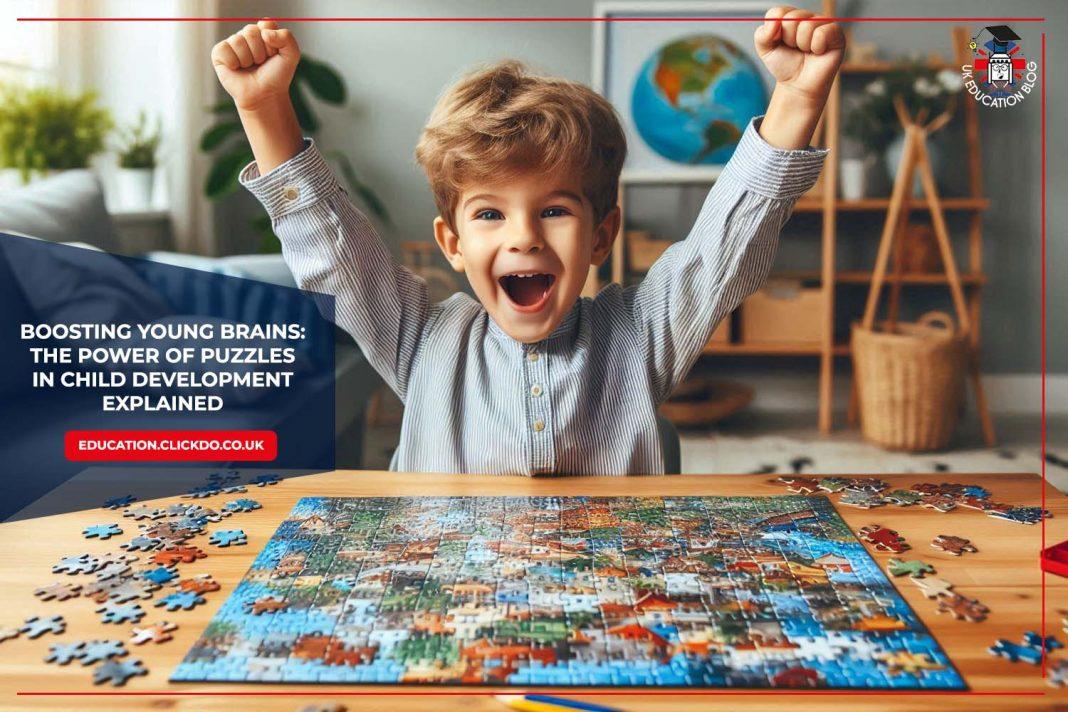Many of us look for simple, yet effective ways to help our children’s minds grow stronger and sharper.
Puzzles offer a hands-on approach that encourages brain development by improving memory, logical thinking and concentration.
More than just a quiet pastime, puzzles challenge young minds to recognise patterns, spot differences, and strengthen their understanding of shapes and visual information.
Alongside these mental benefits, puzzles also support children as they build fine motor skills and hand-eye coordination.
When we integrate puzzles into day-to-day play, our children not only enjoy themselves but also gain opportunities to practise perseverance while discovering new ways to solve problems.
Why Puzzles Are Essential For Brain Development
Puzzles challenge children in multiple ways, offering structured opportunities that promote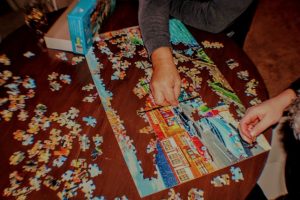 thinking skills and support healthy mental growth.
thinking skills and support healthy mental growth.
These activities boost abilities that children need in everyday learning, from problem-solving and memory to concentration and original thinking.
How Puzzles Stimulate Cognitive Growth
When we give children puzzles, we are encouraging them to analyse, compare, and solve tasks step by step.
This process supports cognitive skills such as logical thinking, spatial awareness, and memory retention.
Key cognitive benefits of puzzles in child development:
- Practising matching, sorting, and categorisation
- Recognising patterns, shapes, and colours
- Following sequences and organising information
Young minds develop problem-solving skills as they learn to fit pieces together, adjust strategies, and tackle challenges from different angles.
Jigsaw puzzles help visual memory and develop recognition of similarities and differences, all of which are essential for academic learning.
Supporting Attention Span and Concentration
Completing a puzzle requires children to focus on a specific goal for an extended period.
This activity helps lengthen their attention span and improve their ability to concentrate on tasks.
As we watch children work through a puzzle, we see them practise perseverance, patience, and determination.
When they encounter difficulties, they are motivated to keep trying rather than giving up.
This persistence helps strengthen their attention span and supports the development of sustained concentration and patience.
The structure of a puzzle, with clear objectives and immediate feedback, reinforces habits such as focusing on details and resisting distractions.
These habits easily carry over into schoolwork and other daily challenges.
Puzzles and Creative Thinking
Puzzles involve more than following directions—they inspire us to think creatively and approach problems from different perspectives.
Open-ended puzzles, such as tangrams and block-building, encourage children to experiment and invent new solutions.
By manipulating shapes, pieces, or images, children learn to visualise outcomes and mentally try different approaches.
This process boosts their imaginative thinking and ability to generate multiple answers to a problem.
Creativity in solving puzzles is closely linked to improved flexibility in thought and better critical thinking skills.
Jigsaw puzzles foster both creative thinking and logical decision-making, helping children become resourceful and confident learners.
Motor Skills And Physical Benefits Of Puzzles
Puzzles play a vital role in supporting children’s motor development by engaging both their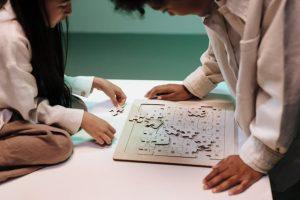 fine and gross motor skills.
fine and gross motor skills.
As children interact with puzzle pieces, they strengthen coordination, dexterity, and control over their hand and body movements in practical ways.
Enhancing Fine Motor Skills
When we encourage children to solve puzzles, they use their fingers and hands to grasp, pick up, and place small pieces, which helps develop fine motor skills.
The precise movements required to manipulate different shapes strengthen finger muscles, improve hand-eye coordination, and build dexterity.
Puzzles with smaller pieces, such as jigsaw or interlocking puzzles, particularly benefit toddlers and young children who are learning to control their hand and finger movements.
Tasks like fitting a piece into the correct spot or rotating a section until it fits stimulate the pincer grasp, necessary for writing and drawing.
Consistent engagement with puzzles can also contribute to improved handwriting skills, as children build the control and strength needed for pencil use.
Fine motor skill development through puzzles is a foundational step for daily activities, as highlighted in the insight on developing fine motor skills and coordination.
Supporting Gross Motor Skills
While puzzles are often associated with small hand movements, certain types can also encourage gross motor skills.
Large floor puzzles require children to use their whole arms, reach, crawl, or even walk as they find and position pieces across a bigger surface.
Group puzzle activities can prompt children to stretch, squat, and shift positions, naturally building coordination and balance.
These movements help to strengthen larger muscle groups and improve spatial awareness as children move around a play area.
For children in early development, this combination of physical activity and problem-solving provides opportunities to practise controlled body movements, which are essential for navigating their environment and participating in more physical play.
As highlighted by occupational therapists, puzzles can help build skills across multiple areas, including the physical capabilities needed for growth and exploration.
Boosting Problem-Solving And Spatial Awareness Through Play
Puzzles play a vital role in helping children master essential thinking skills.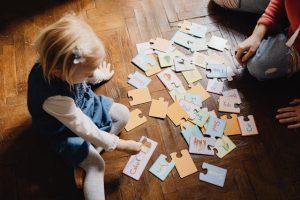
By tackling jigsaw puzzles, pattern games, or logic tasks, we give young learners tools that sharpen their ability to find solutions and recognise how objects fit together in space.
Developing Problem-Solving Skills
When children try to fit puzzle pieces together, they engage in active problem-solving.
They must observe, test different strategies, and learn from errors. This process teaches perseverance, patience, and critical thinking.
We see how puzzles encourage trial and error, allowing children to reconsider their choices if something doesn’t work.
As a result, they strengthen their ability to analyse situations and identify the most effective approach.
Puzzles often require children to remember shapes, colours, or sequences.
This builds their visual memory and helps them spot subtle differences that can lead to a successful outcome.
Activities like these offer a safe environment to practice decision-making and failure recovery, both of which are valuable life skills.
Parents can notice these benefits quickly.
According to research, puzzle play directly nurtures a child’s logical thinking as well as their commitment to see a challenge to the end.
Improving Spatial Awareness With Puzzles
Spatial awareness is the understanding of how objects relate to each other and to ourselves in a given space.
When we give children puzzles to solve, we help them strengthen this ability by encouraging them to rotate, flip, and shift shapes mentally and with their hands.
For example, slotting the correct piece into a jigsaw teaches children to compare outlines and understand the concept of orientation.
This type of play also develops a stronger sense of distance, direction, and proportions.
These are essential skills for later learning in subjects like mathematics, science, and art.
Children who regularly play with puzzles are better equipped to interpret visual information and visualise how different pieces can come together.
According to experts, spatial awareness gained from puzzle activities has long-term impacts on tasks that require reading maps, drawing, and even sports.
Integrating Puzzles Into Everyday Playtime
We can make playtime more meaningful and engaging for children by including puzzles and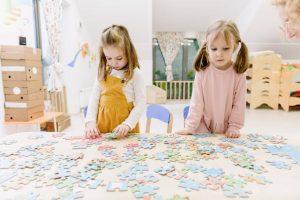 role-play toys that support their growth.
role-play toys that support their growth.
Selecting age-appropriate puzzles and allowing unstructured exploration help to lay a foundation for developing cognitive and social skills.
In addition to puzzles, memory games are a great way to boost children’s focus and memory in a fun, easy way. For ideas on simple memory games that support cognitive development, check out The High School of Glasgow’s guide to the best memory games for children.
Choosing The Right Puzzle Toys
Choosing the right puzzles is crucial for both engagement and skill-building.
For toddlers, large wooden shapes with simple designs are excellent for developing hand-eye coordination and fine motor abilities.
Older children benefit from jigsaws, logic games, and word puzzles that introduce more complexity.
It’s helpful to have a variety of puzzles catering to different skill levels in our collection.
We can rotate these toys to maintain interest and gradually increase the challenge as our children grow.
Family puzzle activities also provide opportunities for shared learning and communication; a diverse range suited for all ages can be found in many family puzzles & games collections.
When we encourage independent problem-solving, we support patience, concentration, and perseverance.
This approach ensures puzzles remain a positive and rewarding part of daily playtime.
Encouraging Exploration And Role Play
Allowing space for exploration makes puzzle play more than just a quiet activity. We can prompt children to mix puzzles with building blocks, figures, or household items.
This gives them room to create new scenarios and stories during playtime. Role-play toys bring a different element, letting children act out social roles and work cooperatively.
Combining role-play and puzzle activities encourages communication and flexible thinking. For instance, children might pretend their puzzle is a treasure map or organise pieces as food in a make-believe café.
Author Profile

- Shirley Owen is a blogger and writer who enjoys writing blogs on education, technology and general news. An avid reader, she follows all the latest news & developments to report on them through her articles.
Latest entries
 careerDecember 30, 2025Why BIM Mastery has become essential for Construction Professionals in 2025
careerDecember 30, 2025Why BIM Mastery has become essential for Construction Professionals in 2025 learningDecember 22, 2025When Co-parenting Affects School Performance – Challenges & Solutions
learningDecember 22, 2025When Co-parenting Affects School Performance – Challenges & Solutions educationDecember 11, 2025Making Education Accessible for Mobile Families that Travel
educationDecember 11, 2025Making Education Accessible for Mobile Families that Travel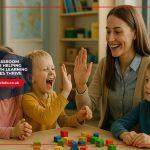 learningOctober 28, 20257 Daily Classroom Strategies Helping Children With Learning Differences Thrive
learningOctober 28, 20257 Daily Classroom Strategies Helping Children With Learning Differences Thrive


